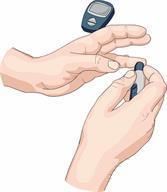Diabetes During Pregnancy
Pregnancy causes changes in your body that can affect your diabetes. When you have type 1 or type 2 diabetes, you need to be careful during pregnancy to keep your blood sugar (glucose) in a healthy range. You can do this with:
- Healthy eating.
- Exercise.
- Insulin or medicines, if needed.
Your health care provider may need to add medicines or increase your doses while you are pregnant. Keeping your blood sugar under control will help keep you and your baby healthy.
How does having diabetes during pregnancy affect me?
Having diabetes can increase your risk of other conditions, such as:- High blood pressure during pregnancy (preeclampsia).
- Heart disease.
- Kidney disease.
How does this affect the baby?
Diabetes can be harmful to an unborn baby. Some problems include:- Risk for pregnancy loss and stillbirth.
- Problems with the organ that provides oxygen and nutrition to the baby (placenta).
- High birth weight.
- Low blood sugar.
- Breathing problems.
What are blood sugar goals during pregnancy?
 Your provider will set treatment goals for you. In general, you should stay within these blood sugar levels:
Your provider will set treatment goals for you. In general, you should stay within these blood sugar levels:- After not eating (fasting) for 8 hours: 70 to 95 mg/dL (3.9 to 5.3 mmol/L).
- After meals:
- One hour after a meal: 110 to 140 mg/dL (6.1 to 7.8 mmol/L).
- Two hours after a meal: 100 to 120 mg/dL (5.6 to 6.7 mmol/L).
- HbA1C level: less than 6%.
- Check your blood sugar as often as told by your provider.
- Call your provider if your blood sugar is above your target for 2 tests in a row.
Why do I have a low blood sugar?
Low blood sugar (hypoglycemia) can occur if you do not eat enough food, you skip a meal, or you do not eat at the right time of day. It can also happen if you exercise too much.
If you have type 1 diabetes, you have a higher risk of having low blood sugar earlier in your pregnancy. You may not feel the symptoms of low blood sugar the same as you did before pregnancy. Symptoms include:- Dizziness.
- Feeling shaky.
- Sweating.
- Weakness.
Follow these instructions at home:
Medicines
-
Take over-the-counter and prescription medicines only as told by your provider.
-
Plan ahead to make sure you always have insulin or any other medicines that you take.
-
Your provider may tell you to take a low-dose aspirin (81 mg) each day to help prevent high blood pressure while you are pregnant.
Eating and drinking
 What you eat and drink affects your blood sugar and your insulin dosage. A healthy meal plan includes:
What you eat and drink affects your blood sugar and your insulin dosage. A healthy meal plan includes:- Lean proteins, such as chicken, fish, egg whites, and beans.
- Complex carbohydrates, such as oats, whole wheat, and brown rice.
- Fresh fruits and vegetables.
- Low-fat dairy products.
- Healthy fats, such as those from nuts, seeds, and fish.
- Follow instructions about what you may eat and drink.
- Drink enough fluid to keep your pee (urine) pale yellow.
- Eat healthy snacks between meals.
- Keep a record of the carbohydrates that you eat. Do this by reading food labels and learning food serving sizes.
- Follow your sick-day plan when you cannot eat or drink as usual. Make this plan in advance so it is ready to use.
Activity
-
Do physical activity for 30 minutes or more each day or as told by your provider.
- Talk with your provider before you start a new exercise or activity. You may need to make changes to:
- Your insulin or medicines.
- How much food you eat.
Care for your body
-
Stay at a healthy weight. The amount of weight you should gain depends on your body mass index (BMI) before you were pregnant.
-
Get an eye exam during the first 3 months of your pregnancy, or as told.
- Take good care of your teeth by:
- Brushing your teeth and gums two times a day.
- Flossing one or more times a day.
- Going to the dentist one or more times every 6 months.
General instructions
-
Talk with your provider about your risk for high blood pressure during pregnancy.
- Share your diabetes care plan with:
- People at your workplace or school.
- People you live with.
-
Check your pee for ketones when you are sick and as told.
-
Wear a medical alert bracelet or carry a medical alert card.
-
Keep all follow-up visits. Your provider will adjust medicines as needed and check on you and your baby's health.
Where to find more information
-
American Diabetes Association (ADA): diabetes.org
-
American College of Obstetricians and Gynecologists (ACOG): acog.org
Contact a health care provider if:
-
Your blood sugar is at or above 240 mg/dL (13.3 mmol/L).
-
You have been sick or have had a fever for 2 days or more and you are not getting better.
- You have any of these problems for more than 6 hours:
- You cannot eat or drink.
- You have nausea and vomiting.
- You have diarrhea.
Get help right away if:
-
You have severe hypoglycemia. This means your blood sugar is below 54 mg/dL (3 mmol/L).
-
You become confused.
-
You have trouble breathing.
-
You have chest pain.
-
Your baby is moving less than usual.
-
You have cramping in your abdomen or have pain in your pelvis or lower back.
- You have symptoms of preeclampsia. These include:
- A severe, throbbing headache that does not go away.
- Vision changes, such as blurred or double vision, light sensitivity, or seeing spots in front of your eyes.
- Sudden or extreme swelling of your face, hands, legs, or feet.
-
Do not wait to see if the symptoms will go away.
-
Do not drive yourself to the hospital.
This information is not intended to replace advice given to you by your health care provider. Make sure you discuss any questions you have with your health care provider.

